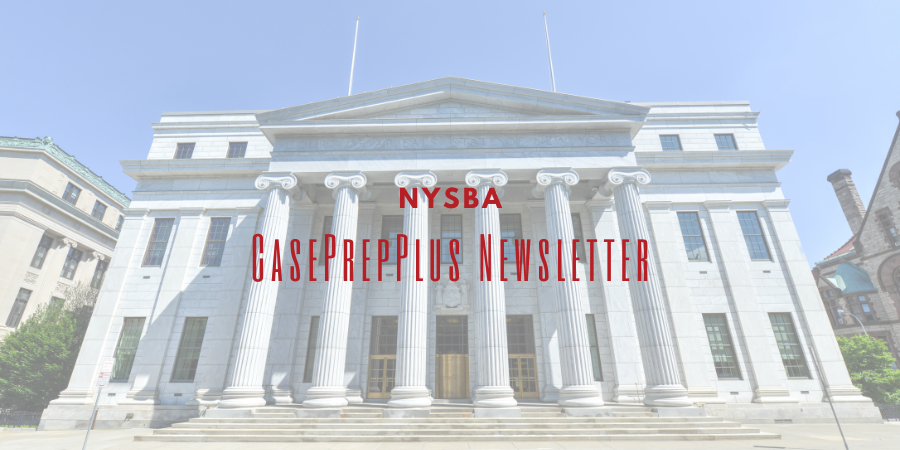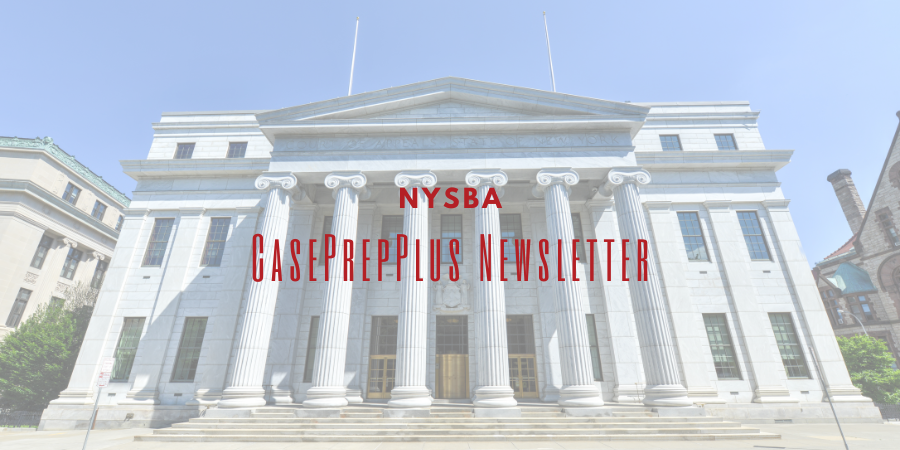
NYSBA CasePrepPlus Newsletter
Welcome to a new iteration of NYSBA’s CasePrepPlus newsletter, an exclusive and valuable benefit of NYSBA membership! My name is Rob Rosborough, and I’m honored to be the new editor of this great service that tries to help you stay up to date with what’s happening in New York’s appellate courts. I’m a partner with Whiteman Osterman & Hanna LLP in Albany, a member of NYSBA’s Committee on Courts of Appellate Jurisdiction, and focus my practice primarily on appellate litigation in the New York state and federal courts. Before joining the firm, I was a Senior Court Attorney at the New York Court of Appeals, and I now publish on new and leaveworthy developments in New York law at my blog, New York Appeals (https://nysappeals.com).
My goal as the new editor of CasePrepPlus is not only to help you learn about the significant decisions of the Court of Appeals and Appellate Division that could impact your practice, like I have used the service for many, many years, but also to make this endeavor interactive. Do you have a decision that could impact a wide area of law or a quirky procedural issue that could be a trap for the unwary (and we all know the CPLR has many)? Have you noticed an issue on which the Appellate Division departments have split or a novel case that could be headed to the Court of Appeals? Do you have an idea for how we can make this weekly newsletter serve you better? Shoot me an email (rrosborough@woh.com) or find me on social media (@NYSAppeals, pretty much everywhere).
With that said, here’s what has been happening in New York’s appellate courts over the past few weeks.
Appellate Division, First Department
People v Adams, 2023 NY Slip Op 04490 (1st Dept Sept. 7, 2023)
Civil Procedure, Sex Offender Registration Act
Issue: When and how may a court reopen a Sex Offender Registration Act (SORA) risk level determination after it is initially made?
Facts: After the defendant was classified as a level two sex offender pursuant to the Sex Offender Registration Act (SORA), the People moved to reopen the SORA hearing on factor seven, for which the court previously declined to assess 20 points because the People had not demonstrated that the victim was a stranger to the defendant, relying on new evidence that it had in its possession at the time of the original SORA hearing, but had not submitted previously. Supreme Court deemed the motion one for reargument and renewal, granted it, and used the new information that the People submitted to reassess the 20 points it had previously denied, which increased the defendant’s risk level to level three.
Holding: The First Department clarified that only three ways exist to reopen a SORA risk level determination:
- a motion to renew under CPLR 2221(e) “where (1) the motion alleges new facts and (2) the movant provides reasonable justification for not offering those facts in the original proceedings”;
- a court may reopen a SORA determination in its “inherent authority” to “correct its own order to rectify a mistake of law or fact” to ensure SORA’s purposes of protecting vulnerable populations and the public are served; or
- a new hearing can be ordered under People v Weber (__NY3d__, 2023 NY Slip Op 03301 [2023]) to give the People an opportunity to make an application for an upward modification, where the People refrained from making that argument when the motion court assessed points at the original hearing that resulted in the risk level that the People sought, but that order is reversed on appeal.
In Adams, none of the three avenues were available. The People had the evidence at the time of the original SORA hearing, so it wasn’t new evidence under CPLR 2221(e) and the People failed to offer any justification for not submitting it the first time around. The motion court’s original determination was correct, so there was no mistake to correct in the Court’s inherent authority. And a People v Weber application is only available where the original SORA determination is reversed on appeal, which didn’t happen here. The First Department, therefore, reversed defendant’s SORA risk level three classification, and reinstated the level two classification.
Appellate Division, Second Department
Domingo v Avis Budget Group, Inc., 2023 NY Slip Op 04463 (2d Dept Aug. 30, 2023)
Civil Procedure, Employment Law, Discrimination
Issue: When may a federal District Court’s factual and legal determination of Title VII and New York State Human Rights Law discrimination claims collaterally estop a subsequent suit between the same parties under the New York City Human Rights Law?
Facts: Plaintiff filed a discrimination suit against her employer in federal District Court under Title VII, the NYSHRL, and NYCHRL, alleging employment discrimination and hostile work environment based on gender and retaliation. The District Court dismissed the Title VII and NYSHRL claims on summary judgment, but declined to exercise supplemental jurisdiction over the NYCHRL claims. Plaintiff then filed the NYCHRL claims in state court, which the employer moved to dismiss as barred by collateral estoppel. Supreme Court dismissed the NYCHRL claims.
Holding: Noting that “[w]here a federal court declines to exercise jurisdiction over a plaintiff’s state law claims, collateral estoppel may still bar those claims provided that the federal court decided issues identical to those raised by the plaintiff’s state claims,” the Second Department held that Plaintiff’s NYCHRL claims were not barred. The federal District Court dismissed the Title VII and NYSHRL claims upon a finding that the discrimination was “neither ‘pervasive’ nor ‘extraordinarily severe.’” That standard, however, does not apply to NYCHRL claims, under which Plaintiff needed only to “prove that they were ‘treated less well than other employees’ because of their gender.” Because Plaintiff’s allegations were that the alleged harassment was “more than petty slights and trivial inconveniences,” even if less than severe or pervasive, collateral estoppel could not bar the NYCHRL discrimination claims.
Appellate Division, Third Department
Matter of Canning v Revior, 2023 NY Slip Op 04623 (3d Dept Sept. 14, 2023)
Civil Procedure, Free Press
Issue: Does a writ of prohibition lie in the Appellate Division to bar a trial judge from holding a reporter in contempt of court for refusing to comply with a subpoena to testify in a criminal trial regarding nonconfidential information obtained during interviews with the defendant?
Facts: In preparing for retrial of the defendant for murder, the People subpoenaed Andrea Canning, an investigative journalist for NBC News, to testify about her interviews with the defendant, portions of which aired on Dateline. Canning moved to quash the subpoena under the New York Shield Law (Civil Rights Law § 79-h), which provides “provides that a journalist shall not be ‘adjudged in contempt by any court in connection with any civil or criminal proceeding’ for refusing to disclose information that enjoys the law’s qualified privilege for nonconfidential news.” Supreme Court denied the motion, holding that the Shield Law didn’t apply and that the privilege had been overcome in any event.
Holding: The Third Department held that, although no right to appeal exists from the denial of a motion to quash a subpoena in a criminal case, Canning could properly seek a writ of prohibition against enforcement of the subpoena because potential erroneous denial of the motion to quash implicated the trial court’s jurisdiction over her and her “other limited options, which may include a challenge to any finding of contempt against her, are untested and implicate her oath and ethics as a journalist, and further pervert the clear language of the statute and legislative history behind the New York Shield Law that seeks to prevent journalists from being threatened with or charged with contempt in the first instance.” The Court then reviewing the merits held that the information sought was protected under the Shield Law, and the People failed to overcome the qualified privilege.
Appellate Division, Fourth Department
People v Johnson, 2023 NY Slip Op 04493 (4th Dept Sept. 8, 2023)
Criminal Law, Evidence
Issue: Under what circumstances may tips from an anonymous 911 caller give police reasonable suspicion to stop or pursue an individual?
Facts: When a caller, who identified himself only by a first name, called 911 to report that “a Black man in an orange jacket had threatened him with a silver, chrome handgun near a particular intersection,” police investigated and observed three Black males at the intersection, one of whom was wearing an orange jacket. When the police exited their car and ordered, with gun drawn, the men to stop, the man with the orange jacket fled. The Police pursued and the man discarded the orange jacket during his flight, in which the police found a loaded .38 caliber chrome handgun. The defendant argued that the gun should be suppressed because the police lacked reasonable suspicion to stop him, and the trial court denied that part of the omnibus motion.
Holding: Since the 911 caller did not identify himself sufficiently for the police to locate him, he was not present at the scene when the police arrived, and the record was not clear that he even gave the police his real name, the Fourth Department treated the caller as if he were anonymous for purposes of the reasonable suspicion analysis. Under the Court of Appeals’ precedent in People v Moore (6 NY3d 496 [2006]), the anonymous tip of a person wearing certain clothing at a particular place in possession of a weapon merely authorized the police to inquire of the suspects; it did not provide reasonable suspicion for a stop and pursuit. Since the trial court erroneously declined to suppress the gun and other tangible evidence, the Fourth Department reversed the defendant’s conviction and dismissed the indictment.
Trial Court Decision of Interest
Constitutional Law, Ethics
Issue: Does the New York State Commission on Ethics and Lobbying in Government, an independent ethics watchdog agency created by the Legislature to replace the Joint Commission on Public Ethics (Executive Law § 94), violate the New York Constitution’s separation of powers?
Facts: Former Governor Andrew Cuomo sued NYSCOELG, arguing that its creation violated the separation of powers doctrine by usurping power granted exclusively to the sitting Governor of New York, after the agency investigated Cuomo’s use of state resources to write his book, American Crisis: Leadership Lessons from the COVID-19 Pandemic, and ordered that he disgorge more than $5 million in profits from the book’s sales.
Holding: The trial court held that because NYSCOELG was granted not only the authority to investigate and report on ethics violations, but also the authority to punish, that usurps the Governor’s power to impose and enforce penalties that has been traditionally the hallmark of executive power. Although doing so could potentially be saved from a separation of powers violation if the agency is accountable to the executive, the trial court held that no such accountability exists in NYSCOELG because the majority of its members are appointed by the Legislature and the Governor lacks any authority at all to remove the members once appointed. Finally, the Court noted that while NYSCOELG has been granted authority to punish current and former executive branch officials found to have violated the ethics laws, it has been denied the same power as to members of the Legislature and their staff, which the Court held arrogates power from the Executive to the Legislature in violation of the separation of powers. The court, however, gave the State an opportunity to demonstrate whether the offending penalty provisions could be severed from the statute to save the remainder of it. Thus, the final judgment on this issue has not yet been reached.

